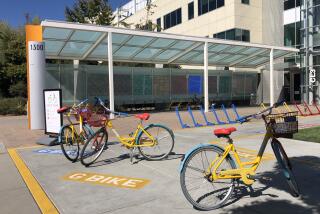‘Job Shop’ : Mainstream: Engineering ‘Kelly Girl’
- Share via
When people ask Bob Kingston about his company, he tells them it’s a Kelly Girl agency for engineers, supplying technicians instead of typists.
Kingston’s company, Mainstream Engineering of Encino, is not nearly as big or famous as Kelly Services Inc., the nationwide temporary-help agency, but the idea is basically the same.
Mainstream is a so-called “job shop,” a company that sends temporary technical labor primarily to aerospace and defense companies. Its employees, known as “job-shoppers” or “techno-cowboys,” are draftsmen and engineers, architects and designers. Many are $8-an-hour draftsmen, but the company also has a $100-an-hour senior engineer fluent in German who translates technical reports.
Job-shopping is a big business in engineering circles. Mainstream is one of about 800 companies doing $3 billion worth of business annually by supplying temporary technical help nationwide, according to the National Technical Services Assn., a trade group in Washington.
Relatively Small Player
Mainstream is a relatively small player in its field. During its last fiscal year, ended April 30, the company had $28 million in sales through its offices in Encino, Santa Clara and Costa Mesa.
It is dwarfed by national chains such as the Philadelphia-based CDI Corp., which has 50 offices and annual revenue of more than $300 million. Kingston used to work for CDI, heading its Encino operation before moving to Mainstream, where he is chairman.
Other competition includes Los Angeles-based Martec Services and the Butler Service Group of Montvale, N.J., which has annual sales of $240 million and 50 branch offices, including one in Orange. Consultants and Designers, a Greyhound subsidiary based in New York, has a branch office in Van Nuys.
Kingston said Mainstream’s biggest challenge over the next several years will be learning to handle the growing competition. The company plans to diversify, possibly by moving into temporary secretarial help and day-care services.
Coping With Changes
Mainstream also will have to cope with changes in the industry, such as the trend by bigger job-shop companies to do engineering or design jobs in their own offices for a flat fee.
Benefiting from the big defense and aerospace industries in Southern California, Mainstream’s number of weekly placements has grown from an average of 400 to 600 over the last four years. Revenue increased 84% over the period and net income rose 27%, to about $460,000 in the fiscal year ended April 30.
During its first quarter ended July 31, sales were $7.3 million, up 29% from the same period last year. Mainstream reported net income of $118,318, up 35% from a year ago.
Profits have lagged behind sales at Mainstream and most of its competitors largely because of increasingly competitive pricing, industry officials say.
Mainstream has faced and survived serious obstacles. In 1983, the company suffered a loss chiefly stemming from the $1 million it spent to break the contract under which it was managed by Raycomm Industries of Freehold, N.J., which owns 80% of Mainstream.
Contract Bought Out
Mainstream bought out the management contract after Raycomm pleaded guilty to a federal criminal charge of conspiring to overcharge the Army for updating tool and equipment manuals, and was barred from doing business with the federal government. Mainstream kept its security clearance by severing its agreement with Raycomm.
Officials of both companies say Mainstream is completely independent of Raycomm. But Raycomm Chairman Joseph J. Raymond, who was fined $8,500 after pleading guilty to submitting vouchers with false entries to the government, rejoined the board two months ago after a two-year absence.
Mainstream bills clients at an hourly rate. For example, Kingston said, Mainstream might bill a client $45 an hour for an engineer. The company would pay $35 an hour to the engineer and keep the other $10 to cover its expenses, payroll taxes and profit.
Mainstream has 75,000 resumes on file, Kingston said. When the company gets a contract, Mainstream’s own staff--the company has about 30 permanent employees at its three offices--begins phoning appropriate engineers and technicians on file. “We bat about 40% picking up people when we need them because some job-shoppers are on file with 50 or 60 services,” he said.
Companies use the technical job-shoppers for the same reasons they use temporary employees in other professions--temporary workers are there when needed and gone when the work is done, without the paper work, benefits and severance pay that go along with most personnel changes. The system allows for fast staffing for busy periods without adding permanent costs.
For that convenience, businesses pay higher hourly wages than they do with full-time staff.
The pay, of course, is one reason many people chose to be job-shoppers. But they must purchase their own medical insurance and take care of retirement plans. They also can be out of work for weeks at a time, although some job-shoppers claim opportunities are better for temporary workers during hard economic times.
The job-shoppers clearly are an independent breed--”captive engineers” is a term many use for regular staff members. They say they like the variety of their jobs and the ability to take long vacations.
Longer Assignments
Mainstream and its competitors are different from other temporary agencies primarily in terms of the time employees spend on different jobs.
Unlike a temporary secretary, who will spend several days or even weeks with a company, an engineer job-shopper is likely to spend six months, or even a year, on an assignment.
Like other David-sized firms up against Goliaths, Mainstream claims to offer more personal service than its competitors. “I know my people and can send the right person for the right job,” Kingston said.
But the usual big-company advantages were cited by Bob Kessler, corporate personnel director for CDI in Philadelphia. He said his company has a larger computer data base of job-shoppers and can offer more people to engineering firms faster.
Nevertheless, Mainstream has been able to snag some big clients, including Lockheed, Hughes Aircraft, Rockwell International, Litton Industries and McDonnell Douglas. Typically, one of these companies will call several technical services simultaneously, and give the contract to the company that can have people ready first.
Short-Term Needs
“We use job-shoppers only to fill needs during short-term peaks,” said Hal Watkins, a Hughes spokesman at the company’s headquarters in El Segundo. “We find we have to hire people fast during those times, and can’t take the time to hire permanent people.”
Watkins said Hughes prefers dealing exclusively with permanent employees when possible. He said job-shoppers are more expensive for the company because their cost is not billed to Hughes’ clients.
“We screen everybody after they arrive, too,” Watkins said. “They have to go through an extensive interview process before we’ll even take them on as job-shoppers. If they seem any less dedicated than our own people, then they’re gone.”
Such screening, however, does not prevent occasional tension with the arrival of temporary workers at an office.
Edward Calkins, a spokesman at Rockwell’s Rocketdyne division in Canoga Park, said friction sometimes develops on design teams because of job-shoppers’ envy of the benefits given permanent employees.
Opposite Problem
Nick Duretta, a spokesman for Lockheed-California in Burbank, a unit of the Lockheed Corp., cited the opposite problem.
“One of our guys might get to talking with a job-shopper, only to find out he’s making a lot more money on an hourly basis,” Duretta said. “If our guy doesn’t care about health insurance or his pension, it can lead to bad feelings.”
Indeed, Mainstream engineer Rich Pandolfi noted that a big advantage of being a job-shopper is that he gets paid for overtime. Pandolfi is now with the Oceanics division of Bendix in Westlake Village as a senior designer.
“Other guys at my level are salaried, and they’re expected to work long hours,” Pandolfi said. “But they don’t get any overtime.”
Chuck Boughner, 47, a Mainstream designer from Canoga Park who has spent 18 of his 29 years in engineering as a job-shopper, said he feels comfortable in that status even during recessions. He said it is during a recession that “those permanent guys get laid off and companies take on people only for what they need.”
Unemployed 2 Years
But Boughner, who works as a “design checker,” has been out of a job for two weeks. “I really dread these times,” he said. “The assignments I’ve been getting have been too far away, so I’ve turned them down.”
Pandolfi, 46, who also lives in Canoga Park, said he does not worry about getting a new job when his last one is completed. “I have contacts at over 30 companies,” he said. “One of them is bound to need me some time.”
Although the workers are free to make their own deal with a company after completing temporary contracts through an agency, many keep their ties to the agencies. One incentive is group health insurance Mainstream and its competitors offer their regular workers--the workers pay a fee, but it’s less than buying insurance on their own.
Pandolfi may find himself working in a Mainstream facility on contracted work within a year.
Will Do In-House Jobs
Kingston said he expects to open an office with drafting and computer-aided-design (CAD) equipment by that time, so he can do jobs in-house like his bigger competitors. He said he would also like to start training engineers on CAD equipment.
Kingston said he hopes to continue expanding the company so that it has 10 offices nationwide by 1990. An office is scheduled to open in Phoenix in September, and Kingston plans to open a San Diego branch next year. Others will be opened in cities where market research studies indicate a growing demand for temporary engineers and designers, he said.
More to Read
Inside the business of entertainment
The Wide Shot brings you news, analysis and insights on everything from streaming wars to production — and what it all means for the future.
You may occasionally receive promotional content from the Los Angeles Times.










